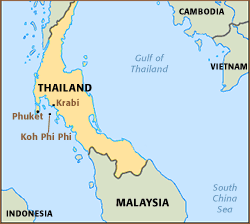UC Berkeley Web Feature
UC Berkeley senior Lea Kreidie tells how she survived the tsunami
 UC
Berkeley student Lea Kreidie
(left) rode out the tsunami
while scuba diving off Thailand's
Phi Phi Islands, located between
the larger island of Phuket
and the mainland. Kreidie is
a double major in political
science and mass communications
who will graduate in May 2005.
She e-mailed this account of
her experience to UC Berkeley
Media Relations.
UC
Berkeley student Lea Kreidie
(left) rode out the tsunami
while scuba diving off Thailand's
Phi Phi Islands, located between
the larger island of Phuket
and the mainland. Kreidie is
a double major in political
science and mass communications
who will graduate in May 2005.
She e-mailed this account of
her experience to UC Berkeley
Media Relations.
I was vacationing on Koh Phi Phi with my best friend and her family during the week of December 24 to 28. We had planned a package trip to Thailand through our scuba diving instructors in Malaysia, where the family lives, to complete our certification in the open waters of the Andaman Sea, off the coast of Koh Phi Phi. ["Koh" means "island" in Thai.]
 The morning of Dec. 26, we woke up at around 8 a.m., got dressed, had breakfast, and headed over to the dive shop. We picked up all our belongings and were on the boat by about 9:15, and a half-hour later we reached our diving destination. At 10:06 precisely we descended into the water and began practicing our skills. This was to be our final dive before we would finally receive our diving certification, and go on to taking leisure dives.
The morning of Dec. 26, we woke up at around 8 a.m., got dressed, had breakfast, and headed over to the dive shop. We picked up all our belongings and were on the boat by about 9:15, and a half-hour later we reached our diving destination. At 10:06 precisely we descended into the water and began practicing our skills. This was to be our final dive before we would finally receive our diving certification, and go on to taking leisure dives.
This was essentially the fourth time I had gone diving in the open sea. I was with my best friend and her sister.
Underwater, things immediately seemed a bit strange. The few fish that we saw seemed to be hiding under us instead of swimming away like they usually did. Even the look on my instructor's face was not that of his normal relaxed state. All of a sudden, my friend started bumping into me. "She usually has control," I thought to myself. "What's going on?" But I just forgot about it for a split second. Then, before we knew it, one of our friends was pushed with a strong force, and at that second we all got pushed.
Somehow we all grabbed onto each other, and the diving instructor held on to all three of us. What seemed like a lifetime of flying underwater lasted only about 10 seconds. One of the girls got pushed onto a huge clump of coral and could not move. The other diving instructor found her and grabbed her, and we all got to the surface safely, where the water was calmer than ever.
I was not panicked, though. I don't know why. I was not aware of what was normal underwater and what wasn't, so I just thought it was some sort of current. Something wasn't right, though. What we had thought at the time was a huge current - it was actually the tsunami - had rocked the underwater world, and yet the surface was completely calm.
Once we got to surface, the instructors inflated these orange emergency sausage-shaped buoys, and our boat came within seconds. We were picked up, and everything was fine.
Or so we thought.
We were told a few minutes later that we could not dive for the rest of the day because it wouldn't be safe, but we did not really understand what was going on. We were then told that we could not return to the island because the waves were too big for docking. So we just chilled on the boat for a while. Hours passed. We still thought we were waiting to go back to Koh Phi Phi. Then night fell, and things started to get a little weird.
All of a sudden, a guy was brought to our boat. He looked totally traumatized but nobody really knew why. He then started saying things like, "I can't find my friends, I don't know what happened, I saw so many dead bodies." He was on the island when the wave hit, and he got out of it. He was then sent to another boat and probably to Phuket, but I don't know exactly what happened to him.
Anyway, that's when we found out what happened. It was unbelievable. We approached the island to see if it would be at all possible to go back and get our things. However, once we began to see the debris in the ocean, we realized how pointless it was to try to go back. The island was completely devastated, we would not have been able to see anything, and our things were probably washed away anyway. At that moment, all we could do was to get out of there in case of another wave.
After waiting for what seemed like a lifetime, the captain finally got us out of there and to another island that had not been hit. It was almost uninhabited, with about 20 Thai people at the most living there. They took us in that night, gave us food and a place to sleep. They were so kind and generous.
It wasn't until the next morning that I finally contacted my parents. The second the sun came up, I went around the town in search of a phone, and one lady had a cell phone. I tried and I tried, the reception was bad, but finally I got through! My mom answered, she screamed my name, and all we could do was cry. My sister had to take the phone from my mom, my mother had lost all her strength and fallen to the ground at that moment, but she was able to get up right away.
I gave them as much information as I could, and they immediately called the U.S. Embassy to give them all the necessary information and make sure they knew I was coming. They were amazing. I can't even begin to express to you how well my family dealt with this. Despite the pain, fear and confusion we had all felt, they were all so strong. My dad had already begun booking a flight to Thailand so he could come be with me and help me out. However, it was fine, and I was able to get things done without having my dad fly out.
 Related stories Related storiesChancellor calls for campus to assist South Asia tsunami victims |
That same day our boat returned to the mainland and got us to the town of Krabi. We took cabs to Phuket's city hall, where the emergency crisis center was set up. There we received some sort of identification card that would get us to our respective embassies in Bangkok, where we would be issued our passports. We eventually reached Malaysia after three days of traveling around in pursuit of getting our passports. Malaysia, as I mentioned before, was where I had begun my travels. I left the next day and met up with my aunt and uncle in the United Arab Emirates. My parents met me there immediately.
We are together now and things are much better.
Kreidie remains overseas. She prefers not be contacted by the media until she returns to UC Berkeley for the start of spring semester on Jan. 18. For information about interviewing Kreidie at that time, call Noel Gallagher at Media Relations at (510) 643-7944.
